Written by: Mensh, ChainCatcher Edited by: Nianqing, ChainCatcher
On November 6, 2024, the most dramatic US election in history came to an end. Trump, known as the "crypto president", was successfully elected, which may mean that crypto has officially entered the White House. At the same time, Bitcoin broke through the $75,000 mark, setting a new record high. The hidden interest groups and beneficiaries behind it will gradually surface.
Crypto lobbying: real money from congressmen to presidents
On May 22, the U.S. House of Representatives passed the Financial Innovation and Technology for the 21st Century Act (FIT21) with a high vote of 279 to 136. The bill, led by the Republicans, aims to amend existing securities and commodity regulations and establish a regulatory framework for digital assets to promote the development of the crypto industry.
The passage of FIT21 is inseparable from the huge campaign expenditures allocated by crypto groups to legislators.
In addition, political action committees influence the election of legislators, which in turn affects the introduction and passage of bills. According to OpenSecret, a political fundraising data tracking platform, political action committees (PACs) supporting cryptocurrencies have invested more than $133 million in elections. Intervened in 51 campaigns, mostly to help candidates who promised not to heavily regulate cryptocurrencies. The three most prominent PACs are Fairshake, Protect Progress, and Defend American Jobs.
The rise of super PACs was aided by the 2010 Supreme Court ruling in Citizens United v. FEC, which enabled corporations and unions to make unlimited spending on political campaigns. The ensuing Speechnow v. FEC case further established the legality of "super PACs," which can accept and spend unlimited donations as long as they do not coordinate directly with candidates or political parties. This is also why the cryptocurrency industry was able to invest up to $133 million in this election.
For example, Fairshake spent more than $10 million to help California Rep. Katie Porter (D-CA) in her unsuccessful Senate campaign and more than $2 million to help Democratic Rep. Jamaal Bowman (D-NY) in New York’s 16th District run for re-election. Both of Fairshake’s targeted candidates lost in their respective primaries. But the super PAC has directed its energy and money to support candidates across the aisle, including California Rep. Michelle Steel and North Carolina Rep. Don Davis, who are both in the running for 2023.
In Ohio’s most expensive election ever, Defend American Jobs spent more than $40 million to support Republican candidate Bernie Moreno in his Ohio Senate race against longtime Democrat Sherrod Brown. Brown’s loss could tip the Senate to the Republicans.
Moreno Bernie’s spokesperson Reagan McCarthy once told The Washington Post: “Unlike Sherrod Brown, who doesn’t know the difference between a blockchain and a chainsaw, Bernie has a deep understanding of this technology, knows how to make sure it grows in America, and will work to make sure America leads the world.”
Protect Progress has spent more than $10 million supporting the campaign of Rep. Elissa Slotkin (D-Mich.). Slotkin voted in favor of the 21st Century Financial Innovation and Technology Act, which seeks to establish a regulatory framework for digital assets. The super PAC also spent $10 million on Rep. Ruben Gallego (D-Ariz.), who believes that “cryptocurrencies are very important in driving technological innovation, economic growth, and job creation” and that there needs to be “an understandable regulatory framework that provides clarity and promotes responsible innovation.”
Coinbase's Brian Armstrong recently told CNBC: "No matter what happens in this election, this will be the most pro-crypto Congress we've ever had."
Which crypto institutions are involved in political donations?
Political donation data can give us a glimpse of the financial backers behind the political stage. Judging from Trump's 47 funding sources for the Trump Political Action Committee, the committee raised a total of $327.47 million in 2024. Among the donors who donated $1 million, Winklevoss Capital Management donated about $2.366 million, making it the second largest donor, and the company's founder is Tyler Winklevoss, the founder of the cryptocurrency exchange Gemini.
Another action committee, Right For America, raised a total of $68.46 million this year, of which A16Z founders Marc Andreessen and Ben Horowitz donated $5 million. Of course, the crypto industry does not only benefit Republicans. Most of the contributors to the three crypto-backed super PACs have no clear party background. They just want to elect crypto-friendly politicians.
Institutionally, most of the donations came from three cryptocurrency trading platforms, Coinbase, Ripple and Jump Crypto, which invested $46.5 million, $46.5 million and $15 million respectively, totaling about $108 million. A16Z also invested $45.2 million.
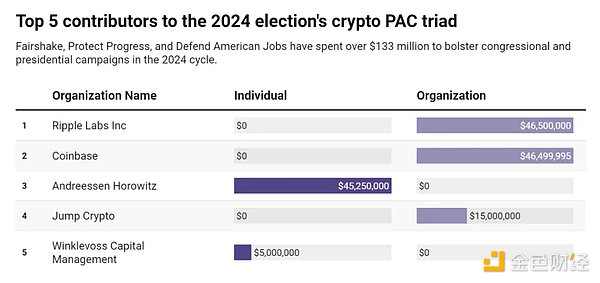
Source: https://www.opensecrets.org/news/2024/11/the-crypto-trio-how-the-cryptocurrency-industry-has-made-its-mark-on-2024-elections/
A recent report released by the nonprofit watchdog group Public Citizen shows that nearly half of the corporate funds flowing into the election came from the cryptocurrency industry.
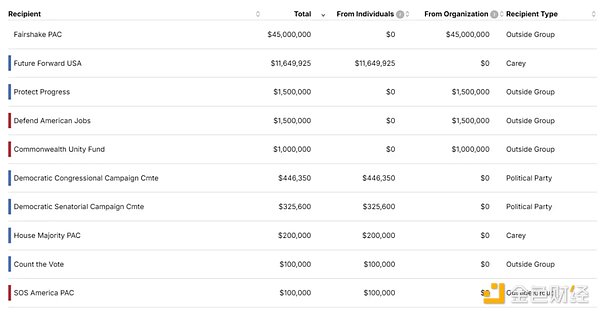
Top 10 Recipients of Ripple Funds in 2024
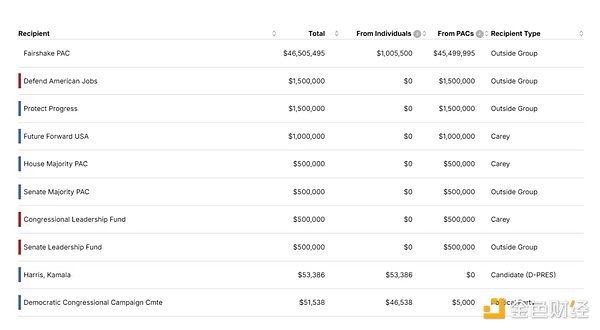
Top 10 Recipients of Coinbase Funds in 2024
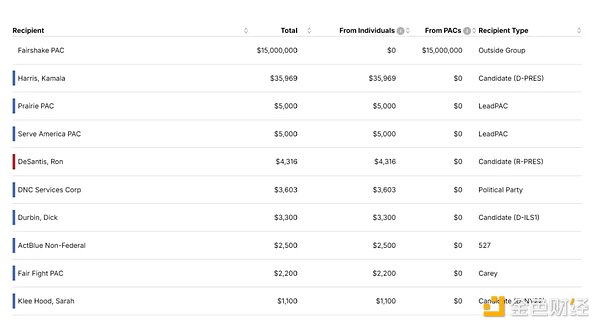
Jump Trading (Jump Trading) in 2024 Crpyto parent company) Top ten recipients of funds
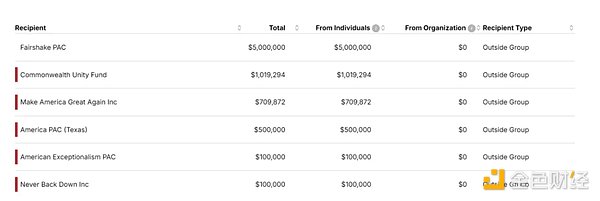
Winklevoss Capital Management recipient of funds
Subsequent positives: Who has already made a move in the game?
The regulatory framework for cryptocurrencies in the United States will inevitably be gradually improved, and the volume of voice in the ears of politicians will inevitably be transmitted through the layers of lobbyist groups. The top exchanges, VCs and foundations have already made arrangements. The figure below summarizes the list of donors of the three super PACs for investors to pay attention to.
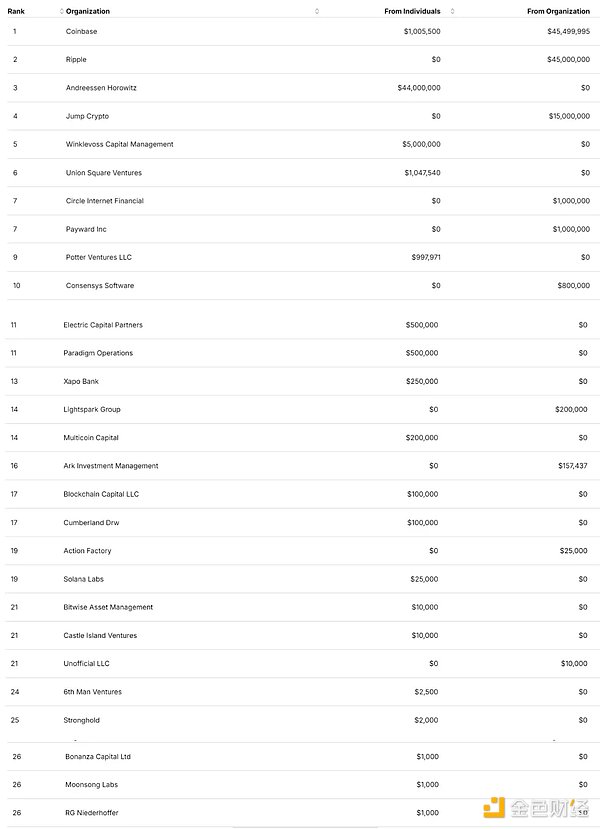
Fairshake PAC Donor List

Defend American Jobs PAC Donor List

Protect Progress PAC Donor List
In addition to A16Z, Coinbase and Ripple, Multicoin also appeared on the list of donors of the PAC with a total amount of only $25,000, which is also worth pondering. With the dream of decentralization, the tug-of-war between cryptocurrency and regulation is still a long way to go.
 Jasper
Jasper












